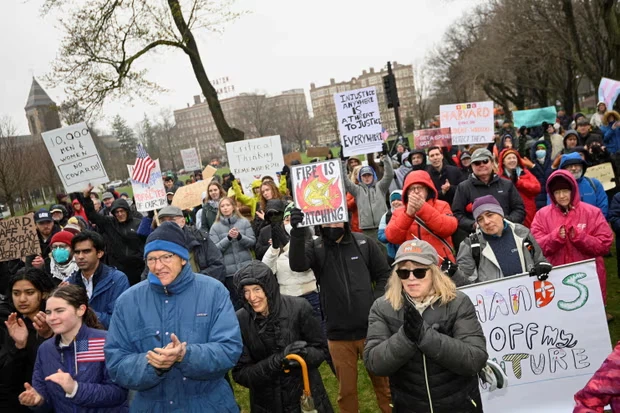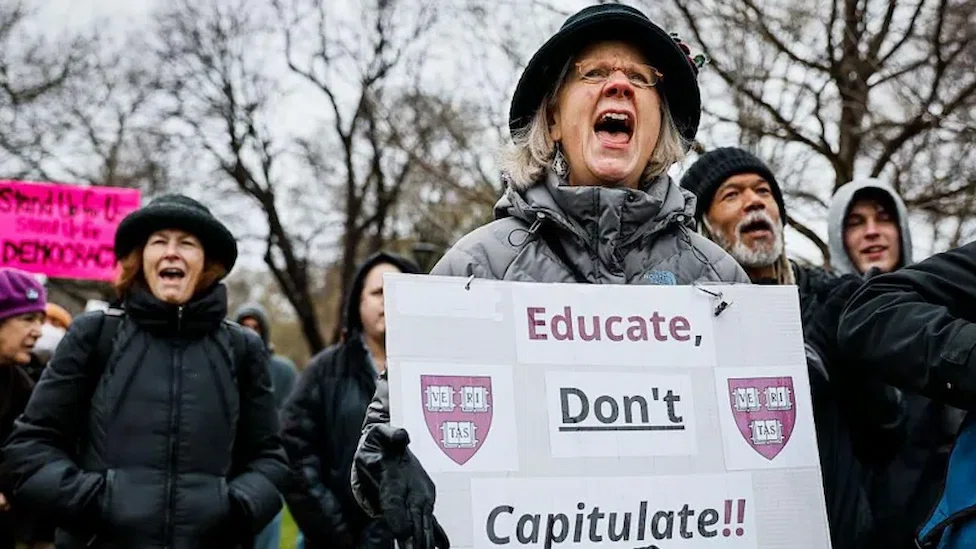Harvard Funding Freeze: The Trump administration has frozen over $2 billion in federal funds for Harvard University. This happened after Harvard rejected White House demands to tackle antisemitism on campus. The demands included changes in hiring, admissions, and teaching policies.
Since Trump’s re-election, his government has pressured elite universities by threatening funding cuts. Harvard refused, calling it an attempt to control its independence. The funding freeze affects research grants and contracts. The Harvard funding freeze has sparked a major debate over government influence in education.
Also Read | Trump Tariff Exemptions Boost European Stocks: Tech Sector Jumps 3%
Harvard Funding Freeze: Insights
- The White House demanded Harvard take steps to fight antisemitism.
- Harvard refused, calling the demands an attack on free speech.
- Federal funds worth $2.2 billion were frozen immediately.
- Columbia University had earlier accepted similar demands.
- Critics say the move is politically motivated.
Background
The Trump administration has targeted elite universities before. It accuses them of failing to protect Jewish students during pro-Palestine protests. Earlier, Columbia University agreed to White House demands after losing 400 million in funding.
Harvard, with a 53 billion endowment, resisted. The government claims universities promote political agendas. Public trust in higher education has fallen, especially among Republicans.
Main Event
On Monday, April 14, 2025, Harvard rejected the White House’s antisemitism demands. The government wanted Harvard to report students “hostile to American values.” It also demanded audits of departments accused of antisemitism.
Harvard President Alan Garber said the demands threatened free speech. The Harvard funding freeze came just hours after the university’s refusal. The Education Department froze 2.2 billion in grants and 60 million in contracts.
The White House letter accused Harvard of failing to meet “intellectual and civil rights conditions.” Harvard called the move an attack on academic freedom. Columbia University had earlier agreed to similar demands. But Harvard, the richest U.S. university, stood firm.
Professor David Armitage said the freeze was “groundless and vengeful.” In March, the government reviewed $256 million in Harvard contracts. Harvard sued, calling it an illegal attack on free speech.

Protesters gather outside Harvard Yard as the U.S. government suspends $2 billion in federal funds, citing the university’s ‘failure to combat antisemitism.
Photo Credits: REUTERS.
Also Read | South Korea’s Chip Support Package Expands to $23 Billion Amid US Tariff Risks
Implications
The Harvard funding freeze affects research projects and faculty jobs. Students may face stricter policies if other universities comply. The dispute deepens political divisions over education. Jewish students may feel safer, but free speech advocates worry.
Businesses linked to university research could suffer. The long-term effects of the Harvard funding freeze remain uncertain. Future government-university relations may become more strained.
Conclusion
The Harvard funding freeze shows a growing clash between academia and politics. More universities may resist or comply under pressure. Legal battles could shape future education policies. Experts warn such moves may harm academic freedom. The debate over antisemitism and free speech is far from over.



